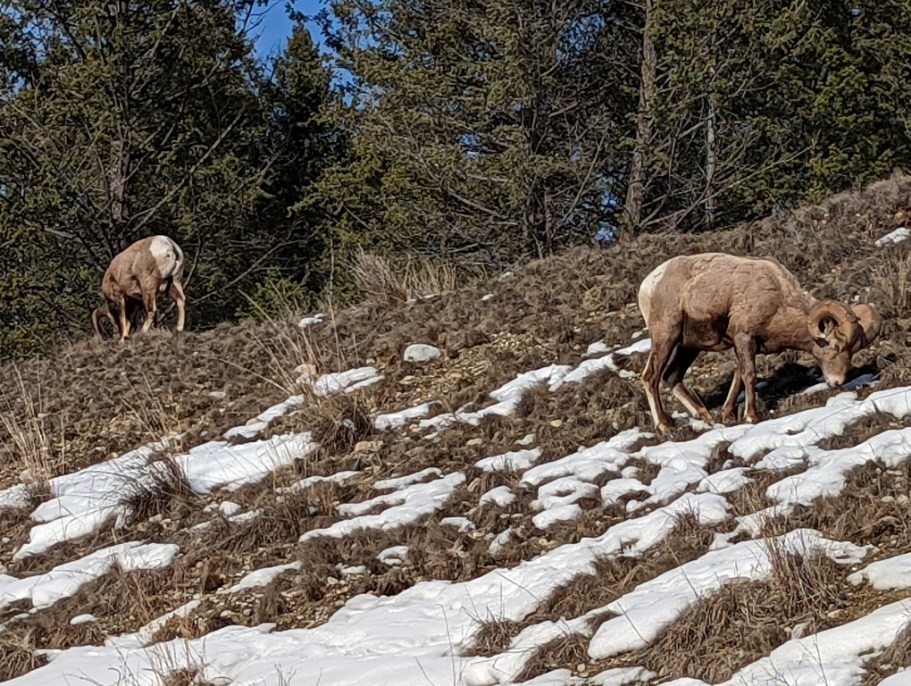Residents living in the village of Radium Hot Springs in B.C. are pushing for change to help save a herd of bighorn sheep.

They’re a magnificent sight for both locals and tourists, but this winter there’s been a spike in the number of bighorn sheep that have died near Radium Hot Springs.
“People are shocked. People are horrified. People are discouraged,” said Radium Hot Springs mayor Clara Reinhardt.
The number of bighorn sheep in the Radium Hot Springs herd has dropped by half over the last 20 years, now down to around 120 animals.
Previously an average of 10 have been killed every year in highway collisions but since November there have been at least 13 road deaths, according to a local wildlife scientist.
“There were seven sheep killed in January alone, so it seems like for 2022 we are on a trend for, unfortunately, a record year,” said University of British Columbia wildlife scientist Clayton Lamb.
RMCP said on Jan. 28, just before 6:30 p.m., officers from the Columbia Valley detachment were called to a report of a collision involving a sheep approximately two kilometres south of Radium Hot Springs.
The sheep died at the scene and the driver and his passenger were assessed at the scene but were uninjured. Their vehicle had to be towed.
- Calgary Fire District launches expanded team of wildland firefighters for 2024 season
- Judicial review filed in response to Calgary city council’s decision to forego rezoning plebiscite
- Calgary issues water reduction advisory ahead of possible restrictions
- Man charged with break and enter, rental fraud in Canmore, Alta.: RCMP
Possible reasons for the spike in deaths this winter include an increase in traffic when the Trans-Canada Highway was rerouted because of construction work.
As well, December’s heavy snowfall may have caused the animals to find exposed grass closer to the highway where they can also be seen licking road salt.
It’s an issue the ministry of transportation and infrastructure says it is looking into, as most de-icers contain salt in some form, which is an attractant for animals.
“The ministry is currently looking at the potential of non-salt de-icers, such as acetate, however, we need to further understand the environmental impacts and how the performance of the material may impact road user safety,” a statement from the ministry reads.
Conceptual plans for fencing and an overpass option for the area of Highway 93/95 — an area commonly known as “Mile Hill” — south of Radium have also been “substantially completed,” the ministry added.
But residents are calling on drivers to be more cautious now instead of just waiting for new infrastructure to be put in place.
“Please slow down. You are in one of the most beautiful places in the world. Have a look. Nothing needs you to be that fast,” Reinhardt said.
Residents of the village have started an awareness campaign on Facebook where the number of sheep deaths are recorded.
“All the comments are from concerned Canadians who are aware that Radium Hot Springs and its iconic bighorn herd is a pretty unique situation and something has to be done about this,” said Nicole Trigg, who started the Help the Radium Bighorn herd Facebook page.
Residents have also set a fundraising target of $400,000 to go towards building a wildlife overpass.
“The solutions should be an overpass and fencing or some form of wildlife crossing structure where we can get the sheep over or under the highway and to exclude them from the highway itself,” said Lamb.
“We know how to build good infrastructure in B.C. but maybe we need to start including wildlife in our considerations of infrastructure. And these are the sort of projects where we can allow animals to cross the highway safer and also keep people and the vehicles and their loved ones safer too.
“So it’s one of these win-win situations where we can keep people and wildlife safer.”
New signage and flashing lights have recently been added to the highway and this weekend provincial patrols were out in marked vehicles, warning drivers about the animals.
“When you now come to Radium Hill, it’s very obvious you’re coming to an area where something is going on with the additional signage and flashing lights and it’s made a huge difference. We had no mortalities this weekend despite a huge amount of traffic coming to the Columbia Valley,” Trigg said.
She said local merchants are also selling products labelled with “Slow Your Roll Save the Sheep.”
“There’s a local clothing company in town called the Kootenay Clothing Company and they came up with a logo and are selling T-shirts and hoodies and bumper stickers where all proceeds from the sales go towards the fundraiser for the overpass,” Trigg said.
Global News reached out to B.C.’s Ministry of Transportation and Infrastructure but as of publishing, had not heard back.




Comments